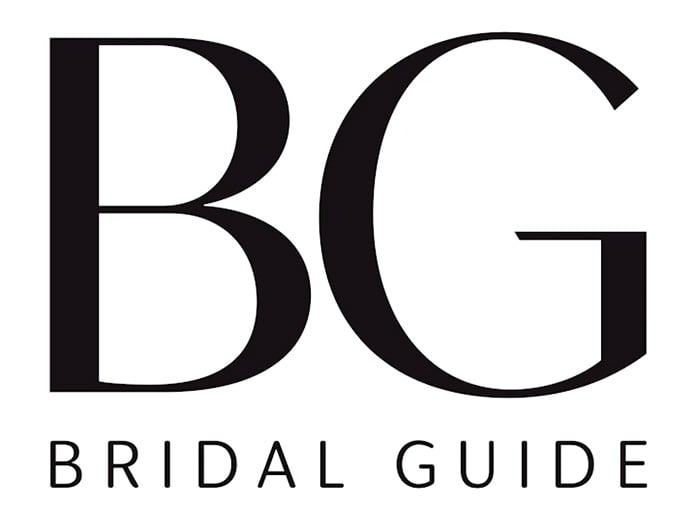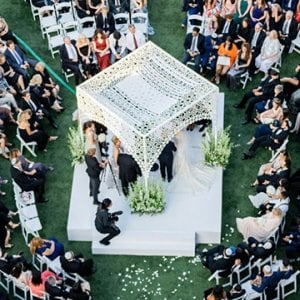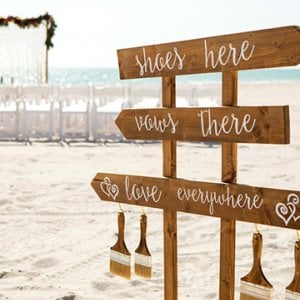Discover a comprehensive guide to traditional and non-traditional wedding party roles to ensure your day is organized and every member knows their duties.
By: Bridal GuideDiscover a comprehensive guide to wedding party roles. Learn the key responsibilities of the bride, groom, family, and attendants to ensure your special day is organized and every member knows their duties for a seamless wedding celebration.
Guide to Wedding Party Roles and Responsibilities
Bride and Groom
The bride and groom's big responsibility is to get married, of course, but here are myriad planning decisions to make first. Ideally the bride and groom work together on these decisions, to share the workload and to make sure both are happy with the plans. A small list of basics:
- Set budget
- Choose date, style and site for wedding
- Meet with ceremony officiant to discuss details
- Coordinate invites, flowers, photographer, etc.
- Shop for wedding bands (each pays for the other's)
- Write wedding vows if they choose
- Send thank-you notes for all gifts.
In addition to their joint responsibilities, the bride and groom each traditionally handle certain details on their own, including each making sure his or her family compiles a guest list.
The bride chooses her bridesmaids and honor attendant. She plans and hosts the bridesmaids' luncheon and gives her attendants thank-you gifts, and buys a gift for groom.
The groom chooses his groomsmen and best man and picks their attire. He buys thank-you gifts for his attendants and for the bride. He arranges and pays for the marriage license and the officiant's fee, and he reserves a block of hotel rooms for out-of-town guests.
Bride's Parents
In the past, the bride's parents usually had the dubious privilege of footing the bill for the majority of wedding expenses. Today costs are likely to be distributed among the bride's parents, groom's parents and the couple themselves, but there are still certain responsibilities the bride's parents hold.
Traditionally they host the first engagement party. They help the bride with the guest list; and offer assistance (and moral support!) with wedding details. The bride's mother chooses her attire, then informs groom's mother of her choice so they can complement each other.
The bride's father gets fitted for formalwear. On the day of the wedding, then he escorts her to the ceremony site and may walk her down the aisle (perhaps with her mother on the bride's other arm). He is the last to leave the reception, after saying goodnight to guests and settling outstanding bills with the caterer, bandleader and coat-check, restroom and parking attendants.
Groom's Parents
Customarily, the groom's parents contact the bride's parents after the engagement. They may host an engagement party (after the bride's parents do). They provide a list of guests to the couple - hopefully sticking to an agreed-upon number. They consult with the bride's parents on attire. They host the rehearsal dinner on the evening before the wedding, and they may contribute to some wedding expenses.
Maid of Honor
Out of all her attendants, the bride relies most heavily on her maid of honor. She serves as the bride's right-hand for both emotional support and practical solutions. Traditionally, the maid of honor is the bride's sister or closest friend. FYI, a married honor attendant is technically referred to as a matron of honor, but that has taken a back seat in recent popular vernacular.
Before the wedding, the maid of honor's duties include coordinating the bridesmaids' activities, such as meeting for a dress fitting and organizing the bridal shower and bachelorette party. She also helps the bride and groom with any preparatory errands or tasks, like addressing the invitations and keeping records of gifts.
On the wedding day, the maid of honor helps the bride dress and accompanies her to the ceremony. She signs the marriage license as the bride's witness, arranges her veil and train during the processional and recessional, and holds her bouquet at the altar. At the reception, she dances with the best man and organizes the bridesmaids for formal pictures. Before the couple leaves for their honeymoon, she helps the bride change, and makes certain her dress and bouquet are kept safe until she returns.
Bridesmaids
You may choose as few or as many bridesmaids as you wish to be in your wedding (although generally 12 is the limit). Bridesmaids can be single or married and of any age, although girls between the ages of eight and 16 become junior bridesmaids and take on abridged responsibilities.
The main role of a bridesmaid is to assist the maid of honor with her wedding-planning duties and help the bride as needed. Your bridesmaids help you with tasks like addressing invitations and will help plan the shower and bachelorette party (and contribute to the cost). The maid/matron of honor and all bridesmaids pay for their own attire, as well as transportation and lodging if they travel to the wedding from elsewhere.
Of course, bridesmaids walk in the processional and recessional. During the reception, they mostly mingle and dance with the groomsmen and other important guests.
Junior Bridesmaid
A girl between the ages of 9 and 13 is typically known as a junior bridesmaid. On the wedding day, she wears a dress that’s usually more age-appropriate than those the adult bridesmaids wear, in the same color and fabric.
She doesn't attend the bachelor/bachelorette party nor is she held to the same financial obligations as the bridesmaids (though her parents will be).
Flower Girl
The flower girl is usually between the ages of four and eight, depending on her level of maturity. During the processional, she walks ahead of the bride, scattering flower petals in her path or simply carrying a pretty bouquet or basket. She should also be included in the wedding rehearsal so that she is comfortable with her role. Her parents are expected to pay for her attire and arrange for her transportation.
The parents of the flower girl are expected to pay for their attire and are invited to attend the rehearsal dinner.
Best Man
Like the maid of honor to the bride, the best man is the groom's biggest source of support. Generally, he is the groom's brother or best friend, and he can be married or single.
The best man's main role before the wedding is to organize the bachelor party. He helps coordinate the groomsmen's formalwear fitting, picks up the groom's attire before the wedding, orchestrates the toasts at the rehearsal party, and confirms the honeymoon travel reservations the day before.
On the day of the wedding, the best man makes sure the groom gets to the ceremony site on time. He brings the bride's ring, holds the officiant's fee until after the ceremony, and signs the marriage license as the groom's witness. Afterward, he organizes the groomsmen for formal pictures, dances with the maid of honor, and orchestrates the toasts during the reception. Finally, he makes sure the getaway car is ready, with the couple's luggage inside. After the celebration, he sees that all rented formalwear is returned
Groomsmen
The groomsmen (sometimes referred to as ushers) have very few responsibilities before the wedding. Mainly, they help the best man plan and host the bachelor party (oh, and get fitted for a fabulous tuxedo). Of course, they should periodically check with the groom and best man to see if they can handle any other tasks.
On the wedding day, the groomsmen should arrive early at the ceremony site, ready to greet (and perhaps seat) guests. They'll be involved in the wedding, and are expected to remain at the reception for its entire duration.
They pay for their own attire, and are responsible for being fitted for and picking up their clothing from the formalwear shop. As well, they pay for their own travel and lodging expenses.
Junior Groomsman
The male counterpart to a junior bridesmaid is a junior groomsman or junior usher (he wears a tuxedo). These “tweens” neither attend the bachelor/bachelorette party nor are they held to the same financial obligations (though their parents will be).
Ring Bearer
The ring bearer is traditionally a boy who carries the wedding rings on a satin pillow (or symbolic rings, with the real rings being held by the honor attendants) down the aisle. The maid of honor and best man take the appropriate rings off the pillow (you may want to tie them on with an attached ribbon for safekeeping) and give them to the bride and groom. Like the flower girl, the ring bearer"s parents pay for his attire and arrange for his transportation.
Traditional vs. Non-Traditional Roles
Weddings today offer couples the flexibility to follow established traditions or to embrace non-traditional roles within their wedding party, reflecting their unique personalities and values. Traditional roles typically include clear-cut responsibilities—such as the bride’s parents hosting the reception, or the best man and maid of honor supporting the couple during every stage of the planning and ceremony.
However, many modern couples opt to customize these roles, perhaps by having a best woman instead of a best man, inviting friends or family members of any gender to serve as attendants, or including children and beloved pets in the ceremony. This shift toward personalization allows the wedding party to reflect the couple’s relationships and values more authentically.
Couples may mix traditional and non-traditional roles to ensure that everyone feels comfortable and included, such as blending cultural customs or creating entirely new positions for close friends. Rresponsibilities like speech-giving, organizing pre-wedding events, or overseeing logistics can be assigned based on personal strengths rather than outdated expectations. By tailoring each wedding party role, couples can craft a truly unique celebration that honors both their individuality and the support of their loved ones.
This evolution allows couples to design a wedding day that feels authentic and inclusive, ensuring that every member of the wedding party is involved in a meaningful and supportive way.






